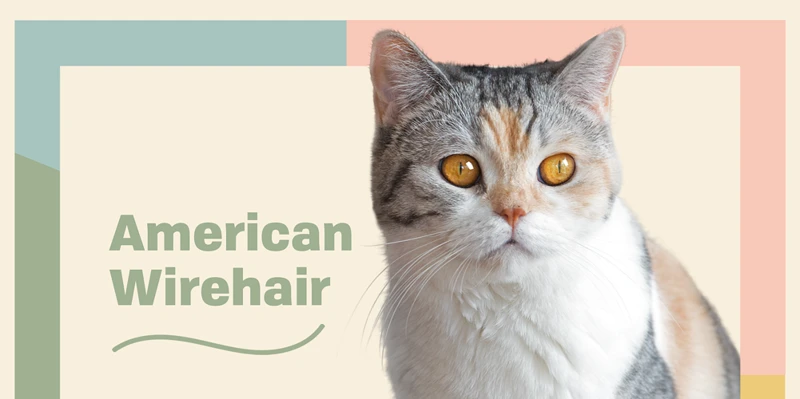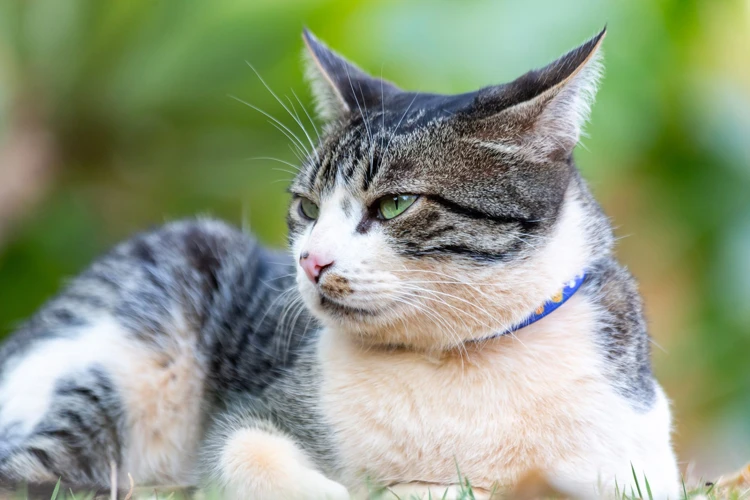As a new pet owner, it’s essential to be aware of the common health concerns that newborn wirehair kittens may face. Taking preventative measures and knowing how to address these concerns can help ensure your pet’s healthy development. This article aims to provide insights into common health concerns for wirehair kittens and how to address them. So, let’s dive right in and discover how to keep your wirehair kitten healthy and happy.
Common health concerns for newborn wirehairs

It’s essential to identify the common health concerns that newborn wirehairs may face to ensure they receive the proper care and attention they need. As a pet owner, it’s essential to have a basic understanding of these health concerns and how to address them. By being aware of these issues, you can take preventive measures to reduce the likelihood of your furry friends experiencing any health problems. In this section of the article, we’ll discuss the most common health concerns for newborn wirehairs, and provide tips on how to address them to keep your kittens healthy and happy. Additionally, we’ll provide links to other articles with related information on wirehair care, such as feeding newborn wirehairs, vet visit tips, and more.
1. Fleas and Ticks
Fleas and ticks are common health concerns for newborn wirehairs that can cause discomfort and even illness if left unchecked. These tiny parasites feed on your kitten’s blood and can lead to anemia, skin irritation, and the transmission of diseases. It’s essential to take steps to address the issue as soon as possible.
Prevention is Key
Prevention is the best defense against fleas and ticks on newborn wirehairs. Keeping your kitten clean and well-groomed is the first step toward preventing infestations. Regular use of flea and tick-prevention products recommended by your veterinarian is also important.
Don’t use over-the-counter flea and tick products unless your vet approves them. Some products can cause serious allergic reactions, organ damage, or even death in wirehair kittens.
Identifying Fleas and Ticks
Wirehairs are more likely to pick up fleas and ticks if they spend time outside or around other household pets. You should frequently check your kitten for signs of infestation, including:
| Signs of Fleas | Signs of Ticks |
|---|---|
| Scratching or biting at skin | Small, dark-brown or black insects |
| Skin redness, inflammation, or rash | Small, round bumps on skin |
| Flea “dirt” or eggs in fur | Tick partially or fully embedded in skin |
Treating Fleas and Ticks
If your wirehair kitten has fleas or ticks, it’s important to act quickly to prevent further infestation. Your veterinarian can recommend the best course of treatment based on the age, weight and overall health of your wirehair kitten. Common options include medicated baths, oral or topical medications and flea collars.
If a tick is embedded in your wirehair’s skin, do not try to remove it on your own. Instead, seek veterinary assistance as soon as possible. You can reduce the risk of ticks by keeping your wirehair kitten out of high-risk areas, or around other animals that may carry them.
By taking preventative measures such as regular grooming, use of approved preventative products and routine visits to a vet, you can keep your wirehair kitten flea and tick-free for a happy and healthy start to his life.
2. Parasites
Parasites are a common health concern for newborn wirehairs. Parasitic infections can cause a range of symptoms, including diarrhea, vomiting, and anemia. Here are some types of parasites that can affect newborn wirehairs:
– Roundworms: Roundworms are intestinal parasites that are common in young kittens. They can be passed to the kittens from their mother through contaminated milk. Symptoms of roundworm infection include a pot-bellied appearance, diarrhea, vomiting, and poor growth. Roundworms can be treated with anti-parasitic medications prescribed by a veterinarian. It is important to note that roundworms are zoonotic, which means they can be transmitted to humans. It is crucial to maintain personal hygiene when handling infected kittens.
– Ear Mites: Ear mites are tiny parasites that live inside the ear canal of infected animals. They can cause irritation, inflammation, and a waxy discharge from the ears. Ear mites can be diagnosed by a veterinarian, who will prescribe a suitable medication for treatment.
– Fleas and Ticks: These insects are external parasites that feed on the blood of animals, causing itching, anemia, and skin irritation. Flea and tick infestations can be prevented with regular use of prophylactic medications such as topical treatments or collars that repel these pests.
– Coccidia: Coccidia are microscopic parasites that can cause diarrhea and dehydration in kittens. They are commonly transmitted through contact with infected feces or contaminated surfaces. Diagnosis and treatment for coccidia typically involves fecal testing and administration of veterinary-prescribed medication.
It is important to note that preventing parasite infections is crucial and can be done with simple preventive measures. Making sure to keep the litter box and bedding clean and disinfected regularly, washing hands properly before handling kittens, providing proper nutrition, and scheduling regular vet check-ups where they will be checked for parasites can all help to prevent parasite infections.
For more information on how to address health concerns for newborn wirehairs, read our article on newborn wirehair care tips.
3. Upper Respiratory Infections
Upper Respiratory Infections (URIs) are common health concerns for newborn wirehairs. These infections are typically caused by viruses or bacteria and can lead to symptoms such as coughing, sneezing, congestion, and discharge from the eyes or nose. URIs can be particularly dangerous for wirehair kittens, as they can quickly progress to pneumonia and other serious respiratory issues.
Signs and Symptoms of URIs
It’s essential to keep an eye out for signs and symptoms of URIs in newborn wirehairs, so you can take prompt action to ensure their well-being. As symptoms can be similar to those of other conditions, it’s crucial to contact a veterinarian as soon as possible if you notice any of these symptoms in your wirehair kitten.
The following table outlines some of the most common signs and symptoms of Upper Respiratory Infections:
| Symptoms | Description |
| Coughing | Frequent coughing spells |
| Sneezing | Repeated bouts of sneezing |
| Congestion | Difficulty breathing due to clogged nasal passages |
| Eye and nose discharge | Yellow or green discharge from eyes or nose |
| Fever | High body temperature |
| Loss of appetite | No interest in food and liquids |
How to Treat URIs in Wirehair Kittens
If you think your wirehair kitten might have a URI, the first step is to contact a veterinarian. In some cases, depending on the severity, treatment might require antibiotics to prevent secondary infections.
It’s essential to keep your wirehair kitten warm and dry to help prevent their condition from worsening. Feeding a wirehair kitten soft food, such as canned meat, can also help increase their fluid intake, which is crucial when they’re sick. In severe cases, hospitalization might be necessary to provide oxygen therapy for the kitten.
Prevention of URIs in Wirehair Kittens
The best way to deal with Upper Respiratory Infections is through prevention before they occur. Keeping the wirehair kitten’s immune system strong with proper nutrition, vaccines, and deworming can help prevent URIs from developing. Maintaining proper hygiene by keeping the wirehair’s bedding, environment, and litter boxes clean and disinfected can remove pathogens that cause URI. This way, it also helps to prevent other infections related health problems such as fleas, ticks and parasites infestation.
If you’re considering adopting a wirehair kitten, it’s vital to provide a stress-free environment with adequate socialization, as stress can lower the immune system making the wirehair prone to URIs. Understanding the signs and symptoms of Upper Respiratory Infections, prevention and prompt treatment are essential in ensuring a wirehair kitten’s proper health and well-being.
For additional information about wirehair kitten care, please check out our articles on wirehair litter health, essential breeding kit for wirehair kittens, and understanding wirehair kitten stages.
4. Fading Kitten Syndrome
Fading Kitten Syndrome is a serious health concern for newborn wirehairs. The term refers to a set of symptoms that cause a kitten to become lethargic, lose appetite, and eventually pass away. This Syndrome can affect both the newborn wirehair puppies and the pregnant mothers. The main cause of Fading Kitten Syndrome is yet to be determined, but it is believed to be a combination of several factors such as malnutrition, infections, environmental conditions, and genetics.
Symptoms of Fading Kitten Syndrome usually start within the first two weeks of a wirehair kitten’s life. Awareness of these symptoms can help you identify the problem early and take necessary steps to address it. Symptoms may include failure to gain weight, weakness, dehydration, diarrhea, vomiting, and lack of appetite. If you notice any of these symptoms in your wirehair kitten, it’s essential to contact your veterinarian immediately.
Fading Kitten Syndrome can be challenging to treat, and prevention is often the best course of action. There are several different steps you can take to prevent this syndrome, such as ensuring proper nutrition, providing a clean and warm environment, and taking necessary hygiene precautions.
One of the primary factors that contribute to the development of Fading Kitten Syndrome is lack of nutrition. To prevent this, make sure that your wirehair kittens have access to a mother’s milk or a suitable milk replacement every two hours. Additionally, provide proper nutrition once your wirehair kitten is old enough to eat solid food.
Maintaining a proper temperature for the kittens is essential, as newborn wirehairs cannot regulate their body temperature. Provide a warm and quiet environment that is free from drafts. You can use a heating pad under half of their crate, bed, or box, to provide a warm spot.
Regular check-ups with your veterinarian are also essential in preventing Fading Kitten Syndrome. During these check-ups, your veterinarian will examine your wirehair kittens, check their weight, and ensure that they are developing as they should be. Regular vet check-ups are essential throughout your wirehair kitten’s life and not just in the first few weeks.
Providing proper hygiene and sanitation is crucial in preventing the spread of infection. Keep your wirehair kitten’s living area clean and disinfected. Wash your hands before handling each kitten.
Fading Kitten Syndrome is a serious health concern that every wirehair kitten owner should be aware of. It can affect the health of your wirehair kitten significantly and lead to death if not treated promptly. By providing proper nutrition, hygiene, and regular check-ups, you can help prevent this syndrome from impacting your wirehair kittens.
5. Dermatitis
Dermatitis is a common health concern for newborn wirehair kittens. This condition is characterized by the inflammation of the skin, which can be caused by various factors, such as flea bites, food allergy, or an immune system disorder. It can be uncomfortable and itchy for your kitten, and if left untreated, it can lead to skin infections and other complications.
To address dermatitis in your wirehair kitten, here are some steps you can take:
- Clean the affected area: Gently clean the affected area with a mild soap and warm water. Make sure to remove all dirt and debris that may be contributing to the irritation.
- Use topical treatments: Depending on the severity of the dermatitis, your vet may recommend a topical treatment, such as a medicated ointment or cream, to help soothe and heal the affected skin.
- Change their diet: If the dermatitis is caused by a food allergy, your vet may suggest changing your kitten’s diet to eliminate the allergen. This may involve switching to a different type of food or feeding your kitten a prescription diet.
- Address flea infestations: Flea bites are a common cause of dermatitis in kittens. Use flea and tick prevention methods (such as maintaining a clean environment, proper grooming, and using flea prevention medication) to help prevent flea infestations.
- Consult with your vet: If your kitten’s dermatitis does not improve with at-home care, make an appointment with your vet. They may prescribe medication to help soothe your kitten’s skin or run additional tests to determine the underlying cause of the condition.
Addressing dermatitis in your kitten is important for ensuring their comfort and overall health. By taking these steps, you can provide relief and promote healing for your wirehair kitten.
How to address health concerns for newborn wirehairs

As with any newborn, wirehair kittens need adequate care to keep them healthy and happy. Unfortunately, there is a likelihood that they may experience common health concerns that may affect their well-being. However, there are steps you can take to address these concerns and ensure your wirehair kitten remains healthy. Let’s take a look at some of the ways you can address these health concerns for your newborn wirehair kitten.
Regular Vet Check-ups
One of the best ways to address health concerns for your newborn wirehair is to schedule regular vet check-ups. Regular check-ups help catch any potential health issues before they become more severe problems. During these check-ups, the vet will perform a full physical examination, check for parasites, and administer vaccinations.
Deworming
Deworming your wirehair kitten is another essential step in addressing health concerns. Roundworms are common in kittens and can cause serious health problems if left untreated. Your vet will prescribe the appropriate deworming medication and provide guidance on the best time to administer it.
Flea and Tick Prevention
Fleas and ticks are a major concern for wirehair kittens as they can transmit diseases and cause skin infections. It is important to administer flea and tick medication to prevent infestations.
Proper Hygiene
Proper hygiene is also vital in addressing health concerns for your wirehair kitten. Regular bathing and grooming help prevent skin infections and keep your kitten’s coat healthy. Additionally, ensuring the litter box is clean and changed frequently helps prevent infections and illnesses.
Proper Nutrition
Proper nutrition is another key factor in addressing health concerns for your wirehair kitten. Ensure that your kitten is getting a balanced diet with appropriate nutrients to support their growth and development. Your vet can provide guidance on the best diet and supplements for your kitten.
Keep reading to learn about preventive measures you can take to keep your wirehair kitten healthy. Alternatively, you can check out our article on wirehair kitten vaccination and deworming to learn more about addressing health concerns in wirehair kittens.
1. Regular Vet Check-ups
Regular veterinarian check-ups are vital in ensuring the health and well-being of your newborn wirehair. During these check-ups, the vet will conduct a full physical examination of the kitten to detect any health issues.
To ensure you get the most out of these visits, it’s important to prepare yourself beforehand. Make sure to bring a list of questions or concerns you have, as well as any medical history of the kitten. It’s also a good idea to bring a stool sample to check for possible parasites.
The vet may also recommend certain vaccinations or tests for your wirehair. These could include screening for feline leukemia virus (FeLV) and feline immunodeficiency virus (FIV). Vaccinations for common illnesses are also important for the health of your kitten.
Regular check-ups can help detect health problems early on, allowing for prompt treatment and better outcomes. It’s recommended to schedule visits every 3-4 weeks until the kitten is around 4 months old, when they can receive their final set of vaccinations.
Here is a table summarizing the benefits of regular vet check-ups:
| Benefits of Regular Vet Check-ups |
| Early detection of health issues |
| Effective treatment and management of health issues |
| Identifying possible parasites |
| Screening for FeLV and FIV |
| Vaccination recommendations |
| Health and behavior advice from a professional |
Regular check-ups with a veterinarian are crucial to maintaining the health and well-being of your newborn wirehair. Be sure to come prepared with questions and any medical history, and follow the recommendations given by the vet. By taking these steps, you can help ensure your kitten grows up to be a healthy and happy wirehair.
2. Deworming
Deworming is a crucial part of keeping newborn wirehair kittens healthy. Kittens can be infected with worms through their mother’s milk or by ingesting infected feces. If left untreated, worms can cause a number of health problems in kittens, including stunted growth, diarrhea, and anemia. That’s why it’s important to deworm kittens regularly.
Here are some tips for deworming newborn wirehairs:
- Schedule a veterinary appointment: A veterinarian can help determine if your kitten has worms and which type of dewormer is appropriate. They may recommend deworming as early as two weeks of age and then every two weeks until the kitten is three months old.
- Choose a safe dewormer: There are many dewormers available on the market, but not all of them are safe for kittens. Your vet can recommend a dewormer that is safe and effective for your kitten.
- Administer the medication properly: Dewormers come in different forms, including tablets, pastes, and liquids. Follow the instructions provided by your vet to ensure that you’re administering the appropriate dosage and that your kitten is getting the medication they need.
- Clean and disinfect the environment: Since worms can be transmitted through feces, it’s important to keep the environment clean and disinfected. Regularly cleaning the litter box with a disinfectant and washing bedding can help prevent the spread of worms.
Deworming is just one of the steps that should be taken to promote the health of newborn wirehair kittens. By following these tips and consulting with a veterinarian, you can help ensure that your kitten grows up healthy and strong.
For more information on promoting the health and well-being of wirehair kittens, please see our article on happy wirehair kitten socialization.
3. Flea and Tick Prevention
Flea and tick prevention is essential for the health and wellbeing of newborn wirehair kittens. These pests can cause a range of health issues, from skin irritation to more serious diseases such as Bartonella and Lyme disease. Here are some effective prevention methods:
| Prevention Method | Description |
|---|---|
| Topical Treatments | Available in the form of sprays, shampoos, and spot-on treatments, these products contain insecticides that repel or kill fleas and ticks. Some topical treatments also help to prevent other parasites, such as heartworms and ear mites. |
| Oral Medications | These are prescription medications that are given to the kitten orally, typically on a monthly basis. They work by preventing fleas and ticks from reproducing or attaching to the kitten’s skin, and some also provide protection against other parasites. |
| Flea Collars | Collars that are specifically designed to protect against fleas and ticks can be effective, but they need to be fitted properly and checked regularly to ensure they are still working. Some kittens may be allergic to the chemicals in the collar, so it’s important to monitor for any signs of skin irritation. |
| Cleaning the Environment | Fleas and ticks can also live in the kitten’s environment, such as bedding and carpeting. Regularly washing bedding and vacuuming the space where the kitten spends most of its time can help to prevent these pests from taking hold. |
| Regular Grooming | Grooming the kitten regularly helps to keep its coat clean and free of fleas and ticks. Use a flea comb to comb through its fur and remove any fleas or ticks that may be present. |
By using a combination of these prevention methods, you can significantly reduce the risk of flea and tick infestations in your newborn wirehair kitten. However, it’s important to consult with your veterinarian before starting any prevention method, as some may not be suitable for all kittens, especially those with underlying health conditions.
4. Proper Hygiene
Maintaining proper hygiene is crucial in keeping newborn wirehairs healthy. They are susceptible to infections due to their weak immune system and vulnerable state. Here are some measures to ensure proper hygiene for your newborn wirehairs:
| Measure | Description |
|---|---|
| Regular Bathing | Bathing your newborn wirehairs regularly will keep them clean and reduce the risk of getting infections. However, overbathing can also strip their skin of natural oils, leading to dryness and irritation. Consult your vet for the proper frequency and method of bathing your wirehairs. |
| Proper Litter Box Maintenance | Wirehairs are instinctively clean animals and they learn to use the litter box quickly. However, the litter box needs to be cleaned regularly to avoid bacterial and parasitic infections. Make sure to scoop the litter daily and replace it every week. Clean the litter box with soap and water regularly. |
| Clean Surroundings | Keep the surroundings of your wirehairs clean and free of clutter. Remove any debris, empty food and water bowls, and clean their toys regularly with soap and water. This will prevent any bacteria from accumulating and causing infections. |
| Regular Grooming | Wirehairs have a unique coat that requires regular grooming to keep it healthy. Brushing their fur regularly will remove any dead hairs and debris, preventing the buildup of bacteria on their skin. Use a soft-bristled brush and comb, and be gentle to avoid hurting their sensitive skin. |
Remember to consult your vet for any specific hygiene measures that need to be taken to keep your wirehairs healthy and happy. With proper hygiene, you can ensure that your wirehairs thrive and grow into strong and healthy adult cats.
5. Proper Nutrition
Feeding your newborn wirehair with the right nutrition is imperative for their growth and development. Here are some ways you can ensure proper nutrition for your furry companion:
- Choose high-quality food: Make sure to choose food that is specifically formulated for kittens. Look for food that has high protein content, as well as taurine, which helps in the development of a healthy heart and eyesight. Consider consulting your veterinarian for recommendations on the best food brands available in the market.
- Feed them frequently: Newborn wirehairs need to be fed frequently, about every 2 to 3 hours. As they grow, the frequency of feeding can be reduced. Ensure that they have access to clean drinking water at all times.
- Avoid overfeeding: While it’s essential to ensure that your kitten gets adequate nutrition, be cautious not to overfeed them. Overfeeding can lead to weight gain, which can cause health complications in the future.
- Don’t feed them adult cat food: Adult cat food may not contain the necessary nutrients that are crucial for the growth of newborn wirehairs. It’s essential to stick to kitten-specific food until they are old enough to transition to adult cat food.
- Consider wet food: Wet food can be easier for kittens to digest than dry kibble. However, it’s essential to ensure that you select high-quality wet food that meets all your kitten’s nutritional needs.
- Avoid feeding them human food: Human food can cause health complications in your kitten. Additionally, some foods can be toxic to your furry companion. Consult with your veterinarian to confirm which foods are safe and which ones to avoid.
Proper nutrition is critical for the health and wellbeing of your newborn wirehair. Following the tips above, and consulting with your veterinarian, will ensure that your kitten receives the necessary nutrition for optimal development.
Preventive Measures
As the saying goes, “prevention is better than cure.” This applies to taking care of newborn wirehair kittens as well. Implementing preventive measures is a crucial step in ensuring their health and well-being. Below are some proactive steps you can take to ensure that your furry friend stays healthy and happy. By following these measures, you can minimize the risk of potential health concerns and give your kitten the best start in life.
1. Regular Cleaning and Disinfecting
Keeping the environment clean and disinfected is crucial in preventing the spread of diseases among newborn wirehairs. Here are some tips to help you with regular cleaning and disinfecting:
- Use a disinfectant – Choose a disinfectant that is effective against a broad range of viruses and bacteria. Make sure to follow the instructions on the label for proper use and dilution.
- Disinfect frequently touched surfaces – Surfaces such as doorknobs, feeding bowls, litter trays, and toys should be disinfected regularly to prevent the spread of germs.
- Change bedding regularly – Bedding should be changed at least once a week, or more often if it becomes soiled. Wash bedding in hot water and dry it completely to kill any germs and bacteria.
- Keep the litter box clean – The litter box should be cleaned daily to prevent the buildup of bacteria, parasites, and viruses. Use gloves when cleaning the litter box and wash your hands thoroughly afterward.
- Keep the area well-ventilated – Proper ventilation helps to reduce the buildup of harmful bacteria in the air. Make sure that the area where the kittens are kept is well-ventilated.
- Practice good hygiene – Make sure to wash your hands thoroughly before and after handling the kittens, and avoid touching their eyes, nose, and mouth.
Regular cleaning and disinfecting is an important part of maintaining a healthy environment for newborn wirehairs. By following these tips, you can help to prevent the spread of diseases and keep your kittens healthy and happy.
2. Proper Socialization
Proper socialization is crucial for the healthy development of newborn wirehairs. Socialization refers to the process of getting the kitten accustomed to human touch, sounds, and smells. It is important to start socializing kittens at a young age to ensure that they grow up to be well-adjusted, confident, and friendly cats. Here are some tips on how to properly socialize newborn wirehairs:
- Start early: The earlier you begin socializing your kitten, the easier it will be for them to adjust to human interaction. Start by handling and cuddling them every day. Make sure to keep the interactions brief, so as not to overwhelm the kitten. Slowly increase the length of time you spend handling them each day.
- Use positive reinforcement: Reward your kitten with treats and praise whenever they exhibit desirable behavior. This will help them associate human interaction with positive experiences.
- Expose them to new experiences: Introduce your kitten to new people, objects, and sounds. This will help them become accustomed to different situations and stimuli.
- Be patient: Socialization is a gradual process, and it may take some time for your kitten to become comfortable with human interaction. Be patient and consistent in your interactions, and eventually, your kitten will learn to trust and enjoy human company.
- Seek professional help: If you are having difficulty socializing your kitten, consider seeking the help of a professional animal behaviorist. They can provide you with valuable advice and guidance on how to properly socialize your kitten.
Proper socialization is essential for the overall health and well-being of your newborn wirehair. By following these tips and being patient and consistent in your interactions, you can help your kitten grow up to be a confident and friendly adult cat.
3. Isolation of Infected Kittens
Isolation of infected kittens is imperative in preventing the spread of diseases and infections amongst newborn wirehairs. Kittens that show signs of illness such as lethargy, lack of appetite, and diarrhoea should be isolated immediately. Creating a separate area for the infected kitten, preferably in a room that can be easily cleaned and disinfected, is essential in preventing the spread of infection to healthy kittens.
Isolation of Infected Kittens is also necessary for preventing the spread of parasitic infections such as ringworm, which is highly contagious and can be passed on to other pets, humans, and even furniture. Isolated kittens should be kept in a clean environment with a separate litter box, bedding, and food bowls. Caregivers should also avoid handling the infected kitten before attending to the healthy kittens, and change their clothes and disinfect their hands before and after attending to the infected kitten.
It is vital to note that isolation should not translate to neglect. Infected kittens should still receive proper veterinary care and attention. Caregivers should monitor the kitten’s condition and keep track of any changes, promptly reporting them to the veterinarian. Isolation should only be discontinued once the kitten has entirely recovered and is free of any symptoms of infection.
To summarise, creating a separate space for infected kittens and observing proper hygiene measures like changing clothes and disinfecting hands before and after handling them can significantly reduce the spread of infections among newborn wirehairs. Prompt veterinary care and attention, monitoring of symptoms, and proper communication with a veterinarian can help speed up the healing process.
| Steps to Isolate Infected Kittens |
|---|
| Create a separate area for the infected kitten |
| Provide a clean environment with a separate litter box, bedding, and food bowls |
| Avoid handling the infected kitten before attending to the healthy kittens |
| Change clothes and disinfect hands before and after attending to the infected kitten |
| Monitor the kitten’s condition and track any changes, promptly reporting them to the veterinarian |
| Discontinue isolation only when the kitten has entirely recovered and is free of any symptoms of infection |
Conclusion
In conclusion, it is crucial for new wirehair owners to be aware of the common health concerns that their furry friends may face. While there are several health issues that newborn wirehairs may experience, proper hygiene, nutrition, and regular vet check-ups can help address and prevent these issues.
In addition to these measures, it is essential for wirehair owners to focus on preventive measures, such as regular cleaning and disinfecting of their surroundings, proper socialization, and isolation of infected kittens. By taking these steps, new wirehair owners can ensure the optimal health and wellbeing of their pets.
Remember, it is always best to consult with a veterinarian if you suspect any health concerns or issues with your wirehair. With proper care and attention, new wirehair owners can enjoy the companionship of their furry friends for many years to come. So, take the necessary steps to keep your wirehair healthy and happy, and always stay vigilant to any changes in their behavior or health.
Frequently Asked Questions
1. What are the most common health issues in newborn wirehairs?
Newborn wirehairs commonly face health issues such as fleas and ticks, parasites, upper respiratory infections, fading kitten syndrome, and dermatitis.
2. Can wirehair kittens get fleas and ticks?
Yes, wirehair kittens can get fleas and ticks which may cause anemia, itching and skin irritation, and even transmit diseases such as Lyme disease or Rocky Mountain spotted fever.
3. How can I prevent fleas and ticks in my wirehair kitten?
You can prevent fleas and ticks in your wirehair kitten by using flea and tick preventatives that are specifically designed for cats.
4. What kind of parasites can affect newborn wirehairs?
Newborn wirehairs can be affected by intestinal parasites such as roundworms, hookworms, and coccidia, as well as external parasites such as ear mites and fleas.
5. What is Fading Kitten Syndrome?
Fading Kitten Syndrome is a condition where newborn kittens appear lethargic, stop nursing, and eventually die. It’s often caused by bacterial infections, parasites, or congenital defects.
6. How can I prevent Fading Kitten Syndrome?
You can prevent Fading Kitten Syndrome by ensuring proper hygiene, adequate nutrition, and prompt medical attention at the first signs of illness.
7. What is dermatitis in wirehair kittens?
Dermatitis is skin inflammation that can be caused by various factors such as allergic reactions, infections, or parasites. In newborn wirehairs, it’s commonly caused by fleas or other parasites.
8. Can proper nutrition prevent health concerns in wirehair kittens?
Proper nutrition can help prevent some health concerns in wirehair kittens by boosting their immune system and providing essential nutrients for growth and development.
9. Can wirehair kittens be bathed regularly?
While it’s important to maintain proper hygiene for wirehair kittens, it’s not recommended to bathe them regularly as it may strip their coat of natural oils and cause skin irritation.
10. Can socialization prevent health concerns in wirehair kittens?
Proper socialization can help prevent some health concerns in wirehair kittens by reducing stress levels, boosting their confidence, and improving their overall well-being.







